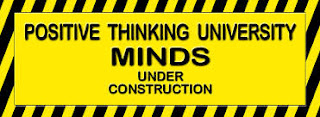Why independent thinking should not be confused with negativity or just plain trouble-making
We all love the thought
of an easy life; one where we don’t worry about bills, money in our pocket or
why we have to (v ‘want to’) use the bus to work in the morning! Our career
journeys are often primed to identify “independent thinkers” that are destined
in our eyes to interfere with our plans for a domestic utopia; with us taking
remedial action at the earliest possible opportunity. This phenomenon is more
common then one might think and in enough numbers can often lead to a malformed
clan culture in companies where protectionism rather than visionary insight
dominate the company culture and arguably its destiny…
So, in walks the fear of
losing one’s job, being relegated in career progression to the guy with deeper
insights and/or just not succeeding like one feels they should ‘cos that guy is
just doing better…’ It may sound like a case of jealousy, but it is a herald
for more serious organisational issues especially in a company(s) where
leadership tends to be weak and reactive in nature.
Needless to say, this if
unchecked ends ups a management issue that can often lead to a rounding on the ‘trouble
maker’ to suppress his or her “performance” or even expel them from the
organisation in the name of employee satisfaction. A direct chase to the finish
line of bad management practice is obviously not the way to go, which is why I
would recommend to any manager the following:
Is the person in
question a balanced independent thinker, a whiner/neigh-sayer or an out and out
trouble maker??? You will find such issues always boil down to the initial
person of interest been accused of being one or more of the three. So quick
definitions of the three and what to do:
Independent
thinker: Articulate, outspoken,
creatively intelligent, passionate about topics and can exude an air of
confidence that at times may intimidate some. Issues often arise due to misunderstandings
and/or folks becoming threatened by their willingness to think and step outside
of the corporate box on issues. Defying conventions can lead to ‘witch hunts’
so beware of folks trying to manipulate events to paint a person like this in a
bad light. If there is ever a need for creative types, it’s in this information
era where innovation happens at an ever faster rate. Direct such engagements towards
mutual accepting of each other’s value to the organisation and to each other.
After all, absent one, the other will be eventually be out of job when the
company fails. Creative and process driven employees make a successful company
in partnership with well rounded leadership of both!
Negativity:
Negative, passive
aggressively forward in meetings and backbiting anybody they feel like behind
closed doors. Such personalities often seek to deflect attention from
themselves by targeting an outspoken independent thinker with the traits they
actually display. They are arguably the master of ‘dirty politics’ and most
difficult to spot as they “seem to be liked” more by the silence of others then
by direct compliment. They are socially active in groups spreading gossip and
an innuendo in an apparently gleeful manner. They are the proverbial ‘wolf in
sheep’s clothing.’ If the person you are informed about is charged with such
transgression, I recommend you evaluate the complainant as much as the initial
person of interest for signs of deception and follow up for signs of social
interactivity that indicate narcissism and a sense of grandiose. Getting them
talking about their correctness in an issue at an appropriate time can be
revealing in this regard. Be sure that after completing your investigation, the
results are impartial and the real narcissist is identified as an issue, which
should be symptomatically addressed in a firm manner as they will raise issues
due to their inevitable (future) infractions, which affords you remedial
reproach. That said, always be impartial but never forget who you are dealing
with.
Trouble
Makers: The need to see how a
bad employee behaves can be subtle like the negative employee or down right
threatening like the argument makers. I had a crazy guy work for me who at a
team meeting in an open space with our team and two senior managers in guest
attendance told me to “lay off the drugs” in a loud disrespectful manner when I
talking. The counselling session afterwards lead to more verbal abuse on his
part where a verbal warning was his prize. If someone makes a claim about
someone you know to be like that, then be sure to not jump to conclusions but
be ready to follow the prescribed disciplinary process of your company after
your initial investigation is complete. The results from the investigation can
start the disciplinary process. People like that are not worth the effort and
arrogantly detract from a team’s effectiveness and longevity in a real way.
They need to be removed and if management don’t support you on it, then find a
new job!
So, you can see that
independent thinkers are the lifeblood of any company's longevity but if you
let bad ones in that carry the traits of negativity and/or trouble maker, then
be prepared to act for everybody’s benefit and future. A “good cultural fit”
often misses this at selection letting in the bad ones and keeping the good
ones out. As a manager, it then becomes your problem to fix it and fix it we
must!
About the author: John Mulhall is a Community Manager and newly Minted
Software Developer. John is also a committed blogger and from February 2016
onwards, will be publishing blogs every second week on topics around
Technology, Leadership and Sustainable Capitalism.
Sources/Credits:
Pics;
Credits:


No comments:
Post a Comment